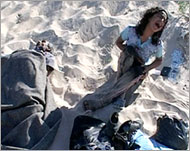By Bahia Amra
Ramallah, 11-06-06

For a few hours at least, the heart rending images of 12-year-old Huda Ghalia sobbing uncontrollably over the limp body of her father drew the world’s eyes towards the daily tragedy of life in Gaza under continued Israeli occupation.
Huda’s entire family, including her father, mother, and five siblings – Ali (25), Ilham (15), Sabreen (4), Hanadi (1), and Haythem (6 months) – were killed when an Israeli gunboat fired seven successive shells at families picnicking on the beach. Huda herself was saved only because she had been swimming in the sea when the shells hit.
TV images broadcast around the world showed the aftermath of the devastation, which destroyed a tent and sent bloody picnic rugs and children’s toys flying into the air, and of Huda screaming ‘father, father’ over a man’s lifeless body.
This is not the first time tragedy has struck the Ghalia family. Less than two years ago, four members of the family were killed when an Israeli military shell hit their farm in the northern Gaza town of Beit Lahiya.
Huda’s plight is perhaps the most tragic of the events depicting the reality of everyday life in Gaza.
In this impoverished, overpopulated prison, daily life is characterised by continuous shellings and sonic booms wrought on the Gazan population by the Israeli military; where prolonged Israeli border closures and the decision by some members of the international community to halt funding to the Palestinian Authority, which formerly paid the salaries of 37 percent of the entire Gazan workforce, have resulted in crippling levels of poverty and unemployment.
Yet once the more newsworthy story of Hamas ending its 16-month ceasefire in response to the Ghalia killings had broken, Huda’s personal catastrophe became invisible.
It would appear that even the decimation of an innocent family is not enough to galvanise the apathetic international community into action in calling on Israel to put an immediate end to such daily atrocities, and to ending its 38-year-old occupation of Palestine.
In such a context, we, the Palestinian people, dare not even think of the disaster we must undergo before the world finally wakes up to our plight.
We call on all our friends and supporters around the world to take immediate action to bring the situation of Huda Ghalia, and of all Palestinians, to the attention of their respective governments. Only through decisive and concerted action on the part of the international community can the 39 years of suffering which the Palestinians have endured under Israeli occupation, ever come to an end.
